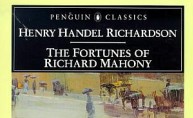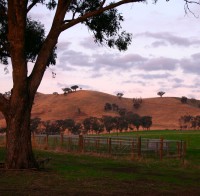- About Us
- Columns
- Letters
- Cartoons
- The Udder Limits
- Archives
- Ezy Reading Archive
- 2024 Cud Archives
- 2023 Cud Archives
- 2022 Cud Archives
- 2021 Cud Archives
- 2020 Cud Archives
- 2015-2019
- 2010-2014
- 2004-2009
 |
Thematic Concerns In The Fortunes of Richard Mahony |
Henry Handel Richardson's The Fortunes of Richard Mahony (in three volumes — 1917, 1925, 1929) is a far too-oft forgotten classic of early Australian literature whose thematic interests bear our analysis if at all to remind us of the value of this great book, invite us back for a second reading or, for the uninitiated, to discover this story for the very first time. Dominant throughout is the universal notion of restlessness, but it is also rich with other thematic interests. In the novel the leading protagonist Richard Mahony is the emigrant who searches far and wide for somewhere that he will fit in and belong, his search symbolic of everyman's quest to discover the "meaning of life".
for a second reading or, for the uninitiated, to discover this story for the very first time. Dominant throughout is the universal notion of restlessness, but it is also rich with other thematic interests. In the novel the leading protagonist Richard Mahony is the emigrant who searches far and wide for somewhere that he will fit in and belong, his search symbolic of everyman's quest to discover the "meaning of life".
From the very outset the theme of money and materialism can be seen clearly — the tale itself is set in Ballarat on the goldfields where men constantly search for gold to try and improve their lifestyle; in the Proem a man has been buried alive in trying to dig for gold in a weak mine shaft. The men on the goldfield are gripped with the "unholy hunger" for wealth, leaving their homes, their families, even their countries, to search for gold, many men ruining their lives in the process. Throughout the novel Mahony constantly tries to pass off the quest for money and materialism as being beneath him — he criticizes his partner Mary for always worrying about their financial security and despises his constant concerns about money and wealth, wondering if he will always be "hounded" by the worry and need of money. And yet while Mahony attempts to convey a lack of interest or real need for money, he ironically always needs finances — he must plan and prepare his finances for his marriage, he is constantly experiencing early problems with his medical practice and is called on to provide finance for Mary's relatives and friends (the Beamish family), his kindness to take John Turnham's children and the birth of his own children both place financial pressures on himself, and his recurring expenses throughout the book are always are source of worry. As we soon realize, Mahony's dismissal of materialism in the place of intellectual pursuits is quite a contradiction — he arrives in Australia to seek his fortunes through mining, retailing, and later as a doctor; his extravagant purchases of property, gifts for Mary, expenses on trips and material objects are all signs of his quest for money and the belief that he is pressured by society into making these expenses (indeed the recurring symbols of gold and sunlight clearly support this theme of money/materialism).
Yet another major theme in The Fortunes of Richard Mahony is that of relationships — not only that of Mahony and Mary, but of many other characters: Tilly and old Ocock, Tilly and Purdy, Agnes and Henry, John Turnham and Emma, and later Agnes, Ned and Polly, and on a larger scale, the relationship, or rather the contrast, between Britain and Australia, highlighted in Mary's attempts at a dinner party in England. Richardson's theme of relationships here tries to not only focus on the relationship between Mahony and Mary, but through the many other examples of relationships tries to convey the theme as one with universal implications, representative of the relationships between all men and women.
Tilly and Purdy, Agnes and Henry, John Turnham and Emma, and later Agnes, Ned and Polly, and on a larger scale, the relationship, or rather the contrast, between Britain and Australia, highlighted in Mary's attempts at a dinner party in England. Richardson's theme of relationships here tries to not only focus on the relationship between Mahony and Mary, but through the many other examples of relationships tries to convey the theme as one with universal implications, representative of the relationships between all men and women.
One final major theme in The Fortunes of Richard Mahony that bears note is that of restlessness, centering on the obvious restlessness of Mahony. As Dorothy Green comments, "A proud, sensitive, restless man finds a land of promise unsatisfying; he tries the land of his birth again and finds it even more unsatisfying; he tries the land of his adoption once more and comes to destruction." It is Mahony's sense of alienation in Australia as an emigrant that is the source of his restlessness, and when he returns to England only to find he still has not gained stability or found his true home we truly see the universal implications of the restlessness theme, symbolic of everyman's search to find the reason of his existence. Mahony's journey into spiritualism and science further evidence this restlessness pushing him to try and find an answer (the recurring symbol of water represents Mahony's "global" sense for security and the symbol of large homes represent "anchors" to provide stability).
Each of these themes in The Fortunes of Richard Mahony ties in together to produce the universal theme that man's quest for the meaning of life is ever prevalent and constant.
The theme of materialism is relevant in that it is representative of man's quest to find a meaning for his existence via the pursuit of wealth or via the pursuit of spiritualism. This dilemma is clearly seen in Mahony himself, who is able to attain a substantial amount of wealth, and yet ventures into the world of spiritualism and science to find his answer. Richardson herself came to the conclusion in her book The Getting of Wisdom that the achievement of a balance in both the spiritual and material aspects of man's existence and of his nature was necessary in life. Richard Mahony's failure to realise this is why, ultimately, he dies so unhappily, feeling his life is unfulfilled.
 The theme of relationships ties further into a broader notion that Mahony is representative of the individual who wants independence yet in the same turn seeks companionship, be it physical or spiritual companionship. This need is seen in all people, thus the theme's universal implication. The theme of restlessness is particularly significant with regard to the novel's central theme, because Mahony is the nomad or wanderer following the "Pythagorean notion" of men as seekers and wanderers, compared to Mary's settled and stable character, is symbolic of all men facing the conflict between change ("panta rei") and permanence ("semper idem").
The theme of relationships ties further into a broader notion that Mahony is representative of the individual who wants independence yet in the same turn seeks companionship, be it physical or spiritual companionship. This need is seen in all people, thus the theme's universal implication. The theme of restlessness is particularly significant with regard to the novel's central theme, because Mahony is the nomad or wanderer following the "Pythagorean notion" of men as seekers and wanderers, compared to Mary's settled and stable character, is symbolic of all men facing the conflict between change ("panta rei") and permanence ("semper idem").
In conclusion, the three major themes of the novel are all interrelated in that they point towards the common theme of The Fortunes of Richard Mahony — that man's search for the meaning of life is never ending and constantly recurring. The mere fact that the story takes place in both hemispheres affirms this universality. As Dorothy Green states, in the book Richardson has created "not merely a pitiful story of an unsuccessful migrant, but a great parable, with tragic overtones, of Man himself, the pilgrim soul whose questing spirit is always engaged in a struggle with his longing to rest."
